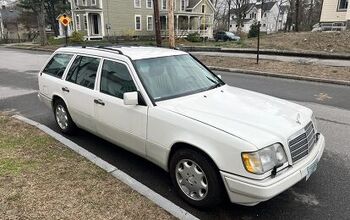Opel: Keep, Sell, or Kill?

For no immediately obvious reason, Germany’s Frankfurter Allgemeine Zeitung has a long article today, which says that GM is running out of patience fast with its money-hemorrhaging Opel unit. The paper predicts new negotiations (read firings and plant closures) with the unions – “or worse.” (Read good riddance Opel.) The sound of rattling sabers is all over the article.
Departing union boss, works council chief and deputy chairman of the Opel supervisory board Klaus Franz insists that there is a contract between GM and the IG Metall union. In return for foregoing raises of €264 million annually, and approving the drawdown of thousands of jobs, the union had received assurances that there will be no more firings or plant closures through 2014.
However, the paper found (probably not without a guiding hand) an escape clause in the contract:
“In the event of material changes to the general economic conditions (significant rise of inflation rate, breakdown of demand in the automotive market) or to the assumptions which build the basis of this agreement, both parties will, in friendly consultations, find solutions for additional measures.”
The paper declares that “there is no doubt that all these events have already been triggered, and that there is “legal basis for GM to put all agreements under review.”
Letting more people go will not translate into immediate savings. As mentioned here repeatedly, a reduction in force costs a lot of money in Germany. FAZ says that “the reduction of 8,000 of the 48,000 jobs at Opel did cost GM nearly a billion Euro.”
That, dear reader, is $168,000 per chopped head.
You can let people go without payment if the company goes bankrupt. This option has been specifically left open. In an SEC filing, GM had warned that a failed restructuring of Opel could prompt a local bankruptcy.
Selling Opel is another option, but to whom? And what would be sold? More than 5,000 engineers develop technology in Rüsselsheim, but the licenses are banked somewhere in Delaware. Basically, the buyer would get a huge Saab, with GM holding the technology reins.
All in all, the article in the usually well-informed FAZ looks like a warning shot, aimed at the unions to cow them into submission.
On the day Stephen Girsky was named Chairman of Opel’s supervisory board, Girsky’s former employer Morgan Stanley issued a scathing research note. The bank figures that Opel is worth “minus $7.6 billion,” and that getting rid of it one way or the other would cost between $5 and 6 billion, a solution the bank recommends.
The analysts figure that selling Chevrolets in Europe would yield a profitable share of 3 percent of the European market, much better than an 8 percent share that only makes losses.

Bertel Schmitt comes back to journalism after taking a 35 year break in advertising and marketing. He ran and owned advertising agencies in Duesseldorf, Germany, and New York City. Volkswagen A.G. was Bertel's most important corporate account. Schmitt's advertising and marketing career touched many corners of the industry with a special focus on automotive products and services. Since 2004, he lives in Japan and China with his wife <a href="http://www.tomokoandbertel.com"> Tomoko </a>. Bertel Schmitt is a founding board member of the <a href="http://www.offshoresuperseries.com"> Offshore Super Series </a>, an American offshore powerboat racing organization. He is co-owner of the racing team Typhoon.
More by Bertel Schmitt
Latest Car Reviews
Read moreLatest Product Reviews
Read moreRecent Comments
- Steve Biro If the U.S. government wants to talk about banning all connected cars - or at least the collection and sharing of information from said vehicles - I’m all ears. Otherwise, don’t waste my time.
- Ajla Both parties are in favor of banning Chinese vehicles so I don't see how it won't happen in the next year.
- Add Lightness I don't waste a lot of time watching nothing much happening by watching the YouTube 6 minute highlights.
- MrIcky from my rental fleet experience, id rather drive one of these than a camry.
- Add Lightness Protectionist fear competition under the guise of paranoia.


































Comments
Join the conversation
After GM got rid of the overcapacities in Trollhättan, which unfortunately didn't lead to the desired result of cleaning out the European car market, a bigger sacrifice will be necessary. I can only congratulate GM strategists on the solution they are deliberating: VW will absolutely love it. Hyundai will go crazy. And Chevrolet will not even fill 20% of the market shares a closure of Opel will make available. Giving up Opel means to abandon the European market. Considering the demographics of Europe, this may be a wise decision - decades ahead of anyone else.
Kill it. Opel used to be a budget car "Made in West-Germany". Now they are pretty expensive but still low quality.